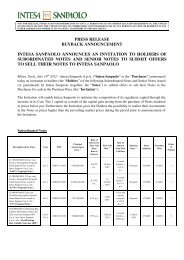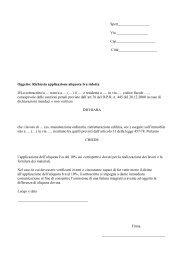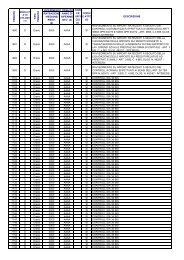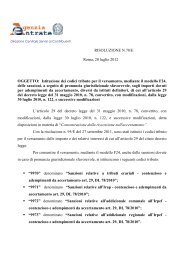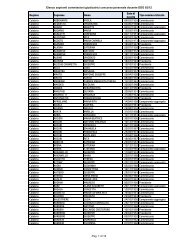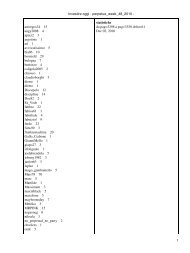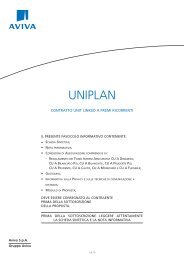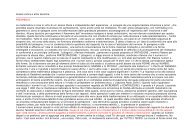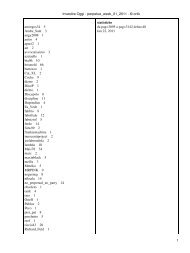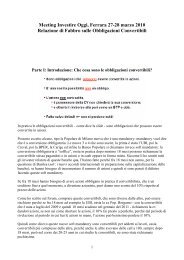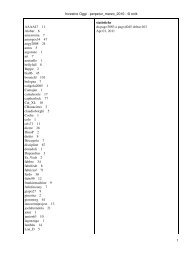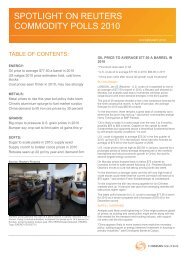Investire Oggi - perpetue_week_50_2010 - © onik
Investire Oggi - perpetue_week_50_2010 - © onik
Investire Oggi - perpetue_week_50_2010 - © onik
You also want an ePaper? Increase the reach of your titles
YUMPU automatically turns print PDFs into web optimized ePapers that Google loves.
<strong>Investire</strong> <strong>Oggi</strong> - <strong>perpetue</strong>_<strong>week</strong>_<strong>50</strong>_<strong>2010</strong> - <strong>©</strong> <strong>onik</strong><br />
impose losses on senior debt due to the need to preserve systemic stability in the current fragile market<br />
conditions, this change of law implies significantly higher risk for subordinated bank debt. In Moody's view<br />
it materially reduces the likelihood of systemic support for Lower Tier 2 debt in the context of bank<br />
bail-outs and may lead to multi-notch rating downgrades for this category of debt.<br />
A detailed list of the affected ratings is available on Moody's website, which may be accessed by clicking<br />
here Research Document - Moody's. The ratings of grandfathered debt qualifying for<br />
"Gewaehrtraegerhaftung" (a guarantee obligation) by regional governments are not affected and hence, are<br />
excluded from the list.<br />
Moody's review for possible downgrade will focus on the implied higher risk for subordinated debt under<br />
the newly established bank resolution regime. For the first time in Germany, it will be possible to separate<br />
subordinated from senior claims under a reorganisation procedure. This would be achieved through either<br />
(i) imposing losses on subordinated debt of a going-concern entity under a reorganisation plan; or (ii)<br />
separating classes of debt into 'going concern' and 'gone concern' legal entities, de facto changing the pari<br />
passu status of subordinated debt outside of liquidation.<br />
"The law allows losses to be selectively imposed on subordinated debt. In a post-crisis scenario, we believe<br />
that its provisions could be used without having a material adverse impact on the stability of the financial<br />
markets", says Carola Schuler, Managing Director for Banking at Moody's in Frankfurt. "Going forward,<br />
the regulators may take advantage of such wider resolution options on a case-by-case basis."<br />
Even though the regulatory tools provided by the Bank Restructuring Act and the German Banking Act are<br />
broad enough to allow the imposition of losses on senior unsecured bondholders as well, Moody's is not<br />
considering rating actions in respect of senior debt for the time being. Haircuts on senior unsecured debt<br />
would be likely to severely disrupt financial markets and, hence, Moody's expects the regulator to tread<br />
very carefully and in accordance with market conditions. Moody's will, however, continue to monitor the<br />
funding situation of German banks and will reassess the relevance of systemic support and financial<br />
stability accordingly on an ongoing basis.<br />
Please see "Assessment of Post-Crisis Support for German Banks" published in April <strong>2010</strong>, for an earlier<br />
comment by Moody's on the rising risk of losses imposed on subordinated debt issued by German banks.<br />
FUTURE RATINGS OF SUBORDINATED DEBT LIKELY TO EXCLUDE SYSTEMIC SUPPORT,<br />
BUT MAY STILL BENEFIT FROM REGIONAL GOVERNMENT SUPPORT<br />
As a consequence of the increased probability that losses may be imposed on subordinated debt, Moody's<br />
will consider removing the systemic support which currently accounts, on average, for three notches of<br />
uplift for this class of bank debt in Germany. Upon the conclusion of the review and in line with "Moody's<br />
Guidelines for Rating Bank Hybrid Securities and Subordinated Debt", Moody's may position the ratings<br />
one notch below its Adjusted Baseline Credit Assessment (Adjusted BCA) which reflects the bank's<br />
stand-alone financial strength including parental and cooperative support.<br />
Currently, the rating of subordinated debt of German banks is positioned one notch below the Bank Deposit<br />
Rating and thus incorporates uplift for all types of external support, including systemic as well as regional<br />
and local government support. The Adjusted BCA adds parental and cooperative support to the intrinsic<br />
financial strength of a bank, but excludes regional and local government and systemic support on a regular<br />
basis. In the process of this review, Moody's may, on a case-by-case basis, consider adding some degree of<br />
regional and local government support to the Adjusted BCA for this particular class of debt, mainly limited<br />
to the Landesbanken. The review will therefore focus on potential support scenarios for public sector banks<br />
199




